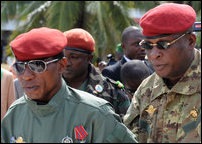Commenting on Sri Lanka’s President Rajapakse’s announcement that Colombo will appoint a 7-person commission to "search for any violations of internationally accepted norms of conduct in such conflict situations, and the circumstances that may have led to such actions [in Sri Lanka], and identify any persons or groups responsible for such acts," Francis A Boyle, professor of International Law at the University of Illinois College of Law said "after it was announced that the ICC was going after Sudan, they hired a British lawyer to advise them on setting up some type of fake internal procedure of investigation/ prosecution in order to head off the ICC, pretending to satisfy the requirement of complementarity. It miserably failed, and Sudan’s Al Bashir is now under ICC’s arrest warrant."
"It is clear that this new commission will not have authority to prosecute anyone. Therefore, the requirements of “complementarity” would be satisfied and Ban Ki-Moon must move forward with the appointment of his committee of experts. This is just another effort by GoSL to stall the war-crimes moves by the United Nations. So far Ban Ki-Moon has gone along with it. But it has now reached the end of its road. It is time for him to act," Professor Boyle said.
The doctrine of complementarity establishes the foundation that the International Criminal Court will complement national courts so that they retain jurisdiction to try genocide, crimes against humanity and war crimes. If a case is being considered by a country with jurisdiction over it, then the ICC cannot act unless the country is unwilling or unable genuinely to investigate or prosecute.
A country may be determined to be "unwilling" if it is clearly shielding someone from responsibility for ICC crimes. A country may be "unable" when its legal system has collapsed.
According to Professor Boyle, Sri Lanka has clearly demonstrated its unwillingness to conduct an internationally acceptable unbiased investigation. The commission has no authority to prosecute, and the Defense Secretary Gotabhaya Rajapakse has threatened with death to eye witnesses who come forward to provide war-crimes testimony.
"The Defense Secretary has also publicly rejected such an investigation by the GOSL itself, and therefore, under international law the onus is now upon U.N. Secretary General Ban Ki-moon to appoint a war crimes investigation body with respect to Sri Lanka as he has recently done in Africa," Prof. Boyle reiterated his earlier call for urgent UN action.
Colombo’s efforts to derail UN’s plans to conduct independent war crimes investigations are remarkably similar to Sudan’s (failed) attempts to stall UN efforts to proceed with indicting Al-Bashir on war crimes charges.
First, in August 2008 Sudan’s Justice Minister announced a special "internal prosecutor" to look into rights abuses committed in war ravaged region of Darfur since 2003, three weeks after Moreno OCampo, prosecutor of the International Criminal Court (ICC), announced that he is seeking an arrest warrant for the Sudanese president Omar Hassan Al-Bashir.
Second, Sudan had lobbied Non-Aligned Movement (NAM), as did Colombo to stall condemn UN’s efforts to proceed with war crimes investigations. Sudan lobbied NAM to condemn Ocampo’s request and called on the UN Security Council (UNSC) resolution deferring Al-Bashir’s indictment.
But ICC’s appointed defense counsel for Darfur case rebuffed Sudanese efforts as "too late," and added, “[t]here can be no internal proceedings and it will not be acceptable anyways. As a starter it will not guarantee the rights of the victims. I am not questioning the integrity of Sudanese judiciary but things have changed today. Sudan could have moved to prosecute war criminals a long time ago," the ICC’s counsel said.
 A spokesperson for US-based activist group Tamils Against Genocide (TAG), said, "rogue states adopt different strategies to deflect blame, even when there is overwhelming evidence of egregious conduct against their own civilians. Recently, Guinea’s military junta hired two former war-crimes specialists as consultants to downplay violence after Guines’s soldiers were accused of massacring civilians. TAG believes that Sri Lanka’s subterfuges are running out of steam, and as HRW recently pointed out, the International community will have to soon take assertive action against Sri Lanka’s game of smoke and mirrors. Additionally, Sri Lanka president’s plan to bring the Attorney General’s department under his control shatters whatever judicial independence that remained after 17th amendement was violated, and this situation may be legally argued as a "constructive" collapse of judiciary, thereby enabling complementarity under the "unable" doctrine, also," TAG’s spokesperson added.
A spokesperson for US-based activist group Tamils Against Genocide (TAG), said, "rogue states adopt different strategies to deflect blame, even when there is overwhelming evidence of egregious conduct against their own civilians. Recently, Guinea’s military junta hired two former war-crimes specialists as consultants to downplay violence after Guines’s soldiers were accused of massacring civilians. TAG believes that Sri Lanka’s subterfuges are running out of steam, and as HRW recently pointed out, the International community will have to soon take assertive action against Sri Lanka’s game of smoke and mirrors. Additionally, Sri Lanka president’s plan to bring the Attorney General’s department under his control shatters whatever judicial independence that remained after 17th amendement was violated, and this situation may be legally argued as a "constructive" collapse of judiciary, thereby enabling complementarity under the "unable" doctrine, also," TAG’s spokesperson added.
(For updates you can share with your friends, follow TNN on Facebook and Twitter )
